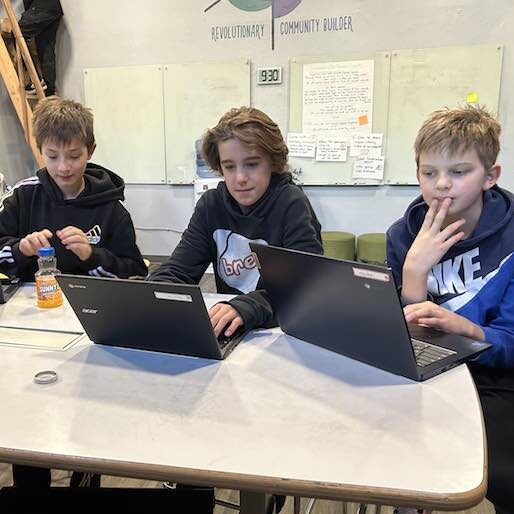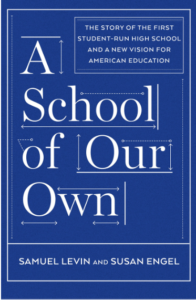
Thinking Beyond the Schoolhouse
Is It Time for a Change?
If you have lived with a teenager or interacted with one regularly, chances are you have heard them complain about school. About 10 years ago, one mom in Massachusetts, likely tired of hearing her son complain, answered with: “So why don’t you start your own (school)?”
So begins the true story at the center of the book “A School of Our Own”, written by Samuel Levin and his mom, psychologist Susan Engel. Called ‘the first student-run high school’, it is actually a semester-long program that students can opt into and it is in fact, run completely by the students themselves. The pilot year, which is described in the book, had just 10 students, but it provides a fascinating look at how things might be different if kids had more influence in what and how they learned.

I found this book after going through the Education Reimagined Learning Lab. As part of my year of inquiry for Decatur Education Foundation, I am reaching far and wide to learn from organizations that are centered on youth in a variety of ways. That lab opened up a whole world to me — and introduced me to a group of educators across the country who are working to change the school-based education paradigm to one that is learner-centered.
Have you ever learned a new word and then you start seeing it everywhere? Once I completed the lab, it was hard not to see the challenges with a school-based paradigm. Even things I had completely taken for granted were called into question. For example, given the differences in child and adolescent development and the neuro-diversity that we now know exists, why is it a good idea to group kids by nothing other than the year or month they were born? Why do all kids, regardless of any differentiating factor, learn the same curriculum on the same schedule? Why is learning seen as only happening in a school building, when in truth learning is happening every minute of every day from the moment we take our first breath?
Obviously, these are not questions that can be easily answered but they are questions to motivate us to consider other methods. I wrote last October about moving from problems to possibilities. What if instead of always looking at the problems with our current model of education, we started to dream of what we could create? What if, like in a School of Our Own, we let our youth lead us?
A Revolution in Education
I recently had a Zoom chat with Chris Unger, a professor at Northeastern University who calls this work “a revolution in education”. He has been at the forefront of a movement to change the way education is structured. His career has focused on the “development and proliferation of learner-centered and agency-focused schools and schooling, entrepreneurship as a means of creating new possibilities in education, the support of change agents and change agent work in our educational ecosystem, and the transformation needed in support of youth, our communities, and society.” Check out the podcast he hosts, A Revolution in Education.
I know our partners at City Schools of Decatur have been gathering input and working on the district’s next strategic plan which recognizes the increased role that our youth can have in crafting the future, as well as alternatives for different types of learners. I look forward to learning more about how CSD will center youth voices in the coming years and how DEF might support that work.
It is not easy to change a paradigm that has existed for 100+ years, but public schools were invented for a very different purpose when they started. Is it time to acknowledge that our world has changed in ways that would be unrecognizable to those born in the early 20th century?
